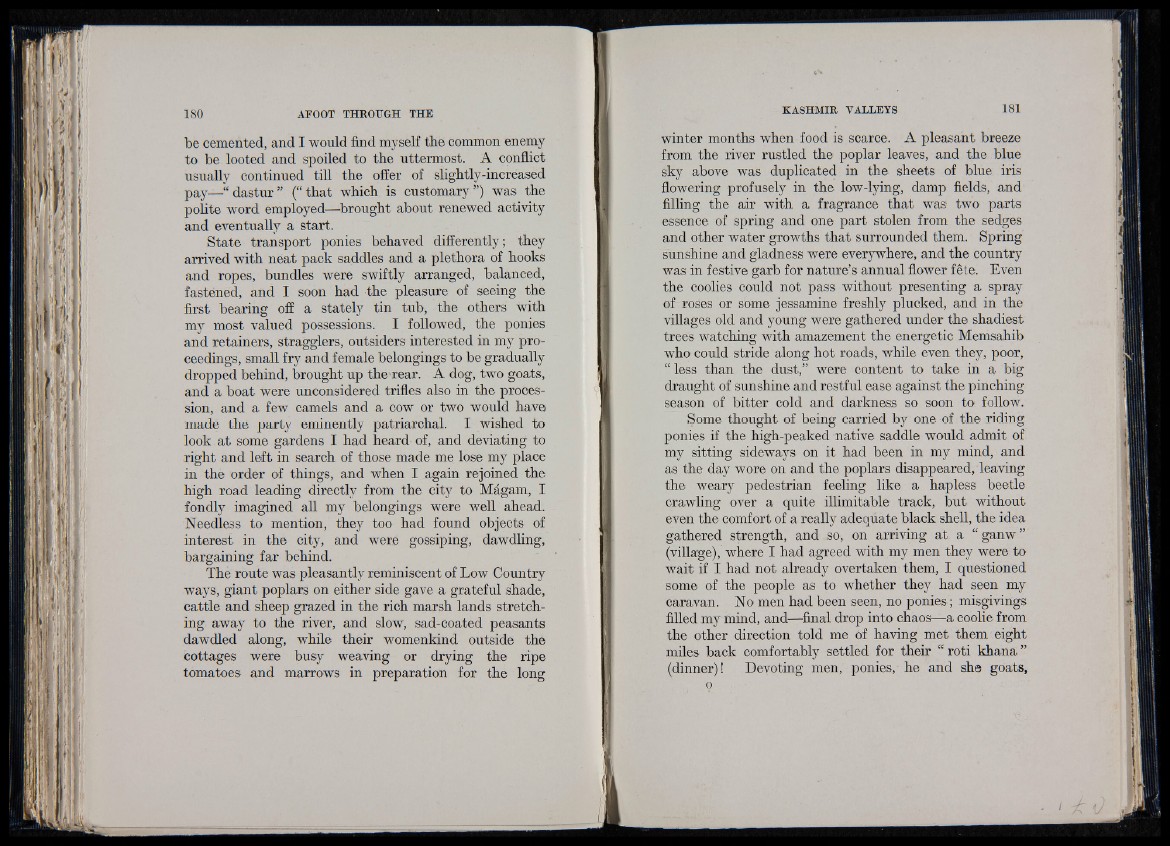
be cemented, and I would find myself the common enemy
to be looted and spoiled to the uttermost. A conflict
usually continued till the offer of slightly-increased
pay—“ dastur” (“ that which is customary”) was the
polite word employed—brought about renewed activity
and eventually a start.
State transport ponies behaved differently; they
arrived with neat pack saddles and a plethora of hooks
and ropes, bundles were swiftly arranged, balanced,
fastened, and I soon had the pleasure of seeing the
first bearing off a stately tin tub, the others with
my most valued possessions. I followed, the ponies
and retainers, stragglers, outsiders interested in my proceedings,
small fry and female belongings to be gradually
dropped behind, brought up the1 rear. A dog, two goats,
and a boat were unconsidered trifles also in the procession,
and a few camels and a cow or two would have
made the party eminently patriarchal. I wished to
look a t some gardens I had heard of, and deviating to
right and left in search of those made me lose my place
in the order of things, and when I again rejoined the
high road leading directly from the city to Magam, I
fondly imagined all my belongings were well ahead.
Needless to mention, they too had found objects of
interest in the city, and were gossiping, dawdling,
bargaining far behind.
The route was pleasantly reminiscent of Low Country
ways, giant poplars on either side gave a grateful shade,
cattle and sheep grazed in the rich marsh lands stretching
away to the river, and slow, sad-coated peasants
dawdled along, while their womenkind outside the
cottages were busy weaving or drying the ripe
tomatoes and marrows in preparation for the long
winter months when food is scarce. A pleasant breeze
from the river rustled the poplar leaves, and the blue
sky above was duplicated in the sheets of blue iris
flowering profusely in the low-lying, damp fields, and
filling the air with a fragrance that was two parts
essence of spring and one part stolen from the sedges
and other water growths that surrounded them. Spring
sunshine and gladness were everywhere, and the country
was in festive garb for nature’s annual flower fête. Even
the coolies could not pass without presenting a spray
of roses or some jessamine freshly plucked, and in the
villages old and young were gathered under the shadiest
trees watching with amazement the energetic Memsahib
who could stride along hot roads, while even they, poor,
“ less than the dust,” were content to take in a big
draught of sunshine and restful ease against the pinching
season of bitter cold and darkness so soon to follow.
Some thought of being carried by one of the riding
ponies if the high-peaked native saddle would admit of
my sitting sideways on it had been in my mind, and
as the day wore on and the poplars disappeared, leaving
the weary pedestrian feeling like a hapless beetle
crawling over a quite illimitable track, but without
even the comfort of a really adequate black shell, the idea
gathered strength, and so, on arriving at a “ ganw ”
(village), where I had agreed with my men they were to
wait if I had not already overtaken them, I questioned
some of the people as to whether they had seen my
caravan. No men had been seen, no ponies; misgivings
filler! my mind, and—final drop into chaos—a coolie from
the other direction told me of having met them eight
miles back comfortably settled for their “ roti khana ”
(dinner)! Devoting men, ponies,* he and she goats,